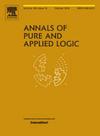Failure of the Blok–Esakia Theorem in the monadic setting
IF 0.6
2区 数学
Q2 LOGIC
引用次数: 0
Abstract
The Blok–Esakia Theorem establishes that the lattice of superintuitionistic logics is isomorphic to the lattice of extensions of Grzegorczyk's logic. We prove that the Blok–Esakia isomorphism σ does not extend to the fragments of the corresponding predicate logics of already one fixed variable. In other words, we prove that σ is no longer an isomorphism from the lattice of extensions of the monadic intuitionistic logic to the lattice of extensions of the monadic Grzegorczyk logic.
一元情况下block - esakia定理的失效
block - esakia定理证明了超直觉逻辑的格与Grzegorczyk逻辑的扩展格是同构的。证明了block - esakia同构σ不能推广到已有一个固定变量的对应谓词逻辑的片段上。也就是说,我们证明了σ不再是一元直觉逻辑的扩展格到一元Grzegorczyk逻辑的扩展格的同构。
本文章由计算机程序翻译,如有差异,请以英文原文为准。
求助全文
约1分钟内获得全文
求助全文
来源期刊
CiteScore
1.40
自引率
12.50%
发文量
78
审稿时长
200 days
期刊介绍:
The journal Annals of Pure and Applied Logic publishes high quality papers in all areas of mathematical logic as well as applications of logic in mathematics, in theoretical computer science and in other related disciplines. All submissions to the journal should be mathematically correct, well written (preferably in English)and contain relevant new results that are of significant interest to a substantial number of logicians. The journal also considers submissions that are somewhat too long to be published by other journals while being too short to form a separate memoir provided that they are of particular outstanding quality and broad interest. In addition, Annals of Pure and Applied Logic occasionally publishes special issues of selected papers from well-chosen conferences in pure and applied logic.

 求助内容:
求助内容: 应助结果提醒方式:
应助结果提醒方式:


